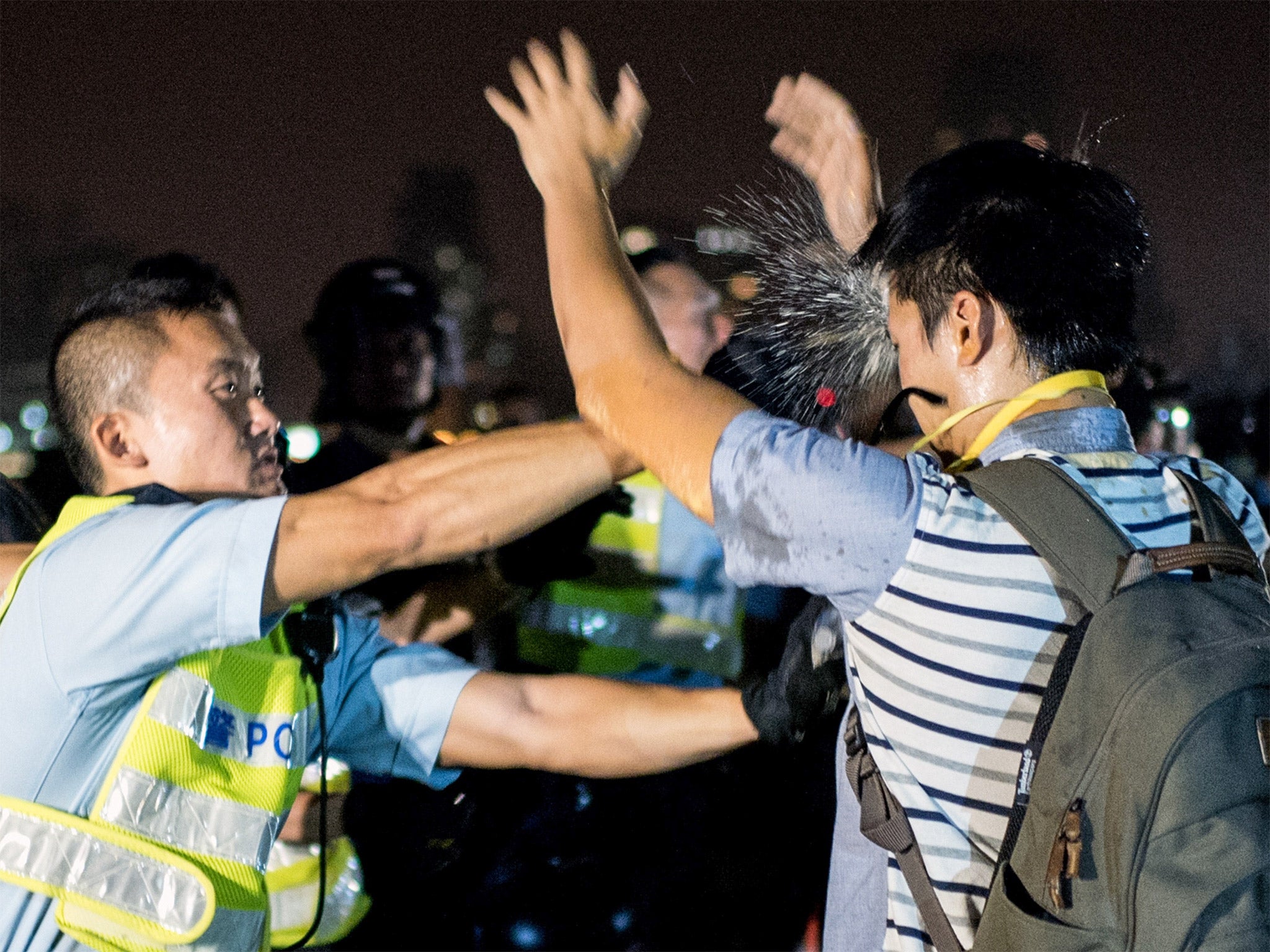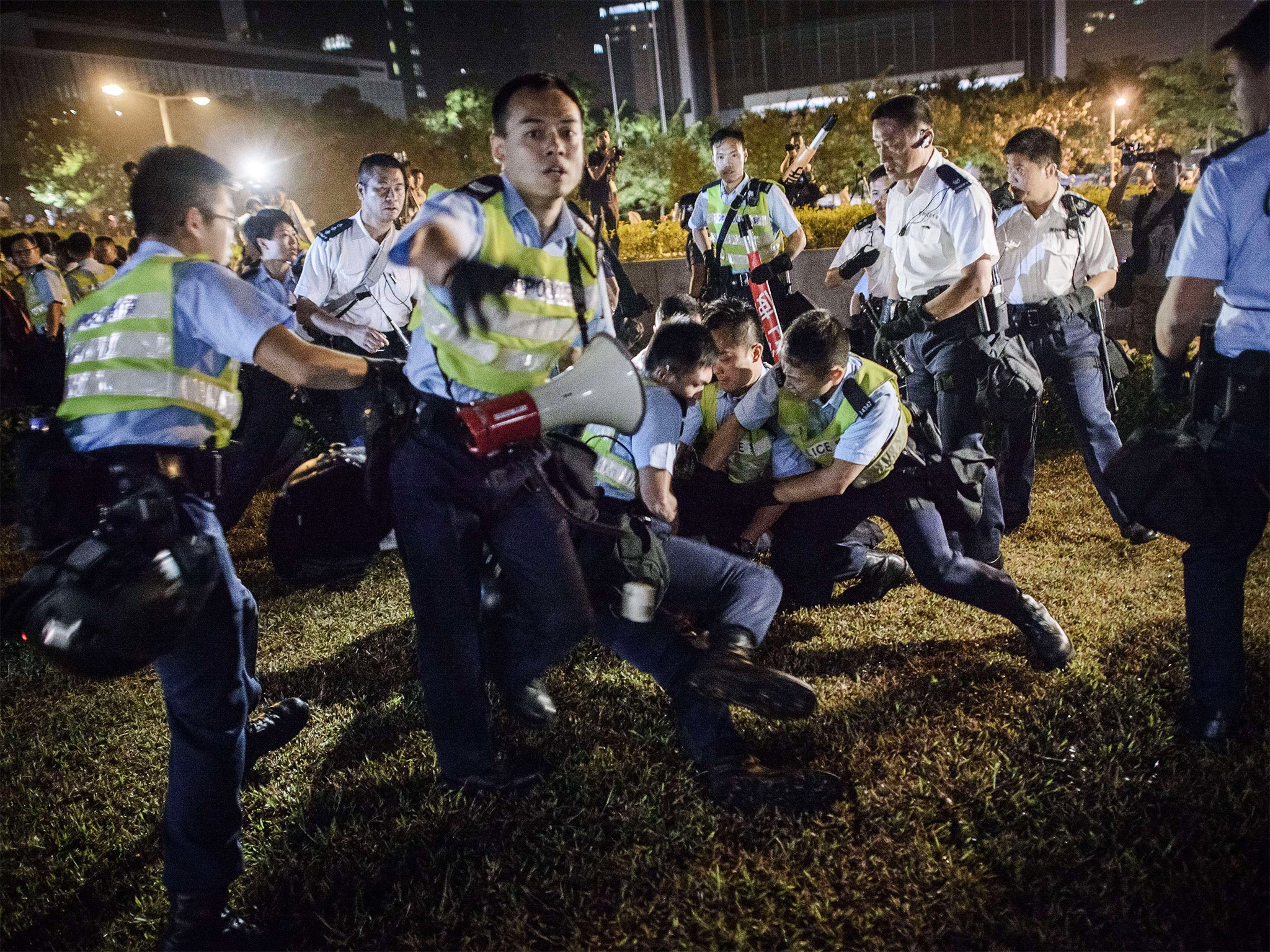Hong Kong police tear down barricades as they move to smash pro-democracy protests
Demonstrators respond by bringing traffic to a halt and chanting slogans about universal suffrage

Your support helps us to tell the story
From reproductive rights to climate change to Big Tech, The Independent is on the ground when the story is developing. Whether it's investigating the financials of Elon Musk's pro-Trump PAC or producing our latest documentary, 'The A Word', which shines a light on the American women fighting for reproductive rights, we know how important it is to parse out the facts from the messaging.
At such a critical moment in US history, we need reporters on the ground. Your donation allows us to keep sending journalists to speak to both sides of the story.
The Independent is trusted by Americans across the entire political spectrum. And unlike many other quality news outlets, we choose not to lock Americans out of our reporting and analysis with paywalls. We believe quality journalism should be available to everyone, paid for by those who can afford it.
Your support makes all the difference.Hundreds of Hong Kong police officers used sledgehammers and chainsaws to tear down barricades near government offices and the financial centre, in what many saw as the denouement of the pro-democracy protests that have entered their third week.
The demonstrations – the largest on Chinese territory since the 1989 Tiananmen Square protests in Beijing – have posed a major challenge for the government.
Today, officers, many of them in riot gear and armed with pepper spray, tore down concrete barricades in and around the underpass, near the entrance to the office of the city’s leader, Leung Chun-ying. Protesters have been calling on Mr Leung to resign.
Despite the heavy-handed tactics used by police, demonstrators retaliated later in the day by swarming into a tunnel on a major four-lane thoroughfare, bringing traffic to a halt and chanting slogans about universal suffrage. Riot police tried to push them back with pepper spray and batons, according to a local news channel, but later retreated.
“I think the government doesn’t respect us,” Kevin Chan, a protester wearing a surgical mask and goggles covering his black glasses, told Reuters. “They have to talk to us and compromise, otherwise we won’t stand down.”
Local television networks broadcast live footage of scuffles between police and protesters, some of whom were arrested and whose hands were tied with plastic cuffs.
Democracy protesters have occupied key parts of the city for more than two weeks to pressure the government over curbs recommended by Beijing on democratic reforms.
The protesters, most of them students, are demanding full democracy for the former British colony. China rules Hong Kong under a “one country, two systems” formula that accords the city a degree of autonomy and freedom not enjoyed in mainland China, with universal suffrage an eventual goal.
But Beijing has said only candidates screened by a nomination committee will be able to contest a full city-wide vote to choose the next chief executive in 2017.
Police operations over the past two days follow the government’s abrupt cancellation of talks scheduled last Friday with the activists, citing the unlikelihood of a constructive outcome given their sharp differences.

The protesters want China’s government to drop plans for a pro-Beijing committee to screen candidates in the elections. They also demand that Hong Kong’s deeply unpopular Beijing-backed leader, Mr Leung, resign. But Mr Leung has said there is “almost zero chance” that China’s government will change its rules for the 2017 election.
Umbrellas have become a symbol of the protests after demonstrators used them to protect themselves against the rain, as well as the pepper spray and tear gas used by police to try to disperse them two weeks ago.
Organisers say as many as 200,000 people thronged the streets at the peak of the protests. Numbers have since dwindled and the remaining demonstrators, sensing that the earlier actions were aimed at testing their defences, have braced for possible further police moves to clear out their protest camps.
Beijing is eager to end the protests to avoid emboldening activists and others on the mainland seen as a threat to the Communist Party’s monopoly on power.
Join our commenting forum
Join thought-provoking conversations, follow other Independent readers and see their replies
1Comments